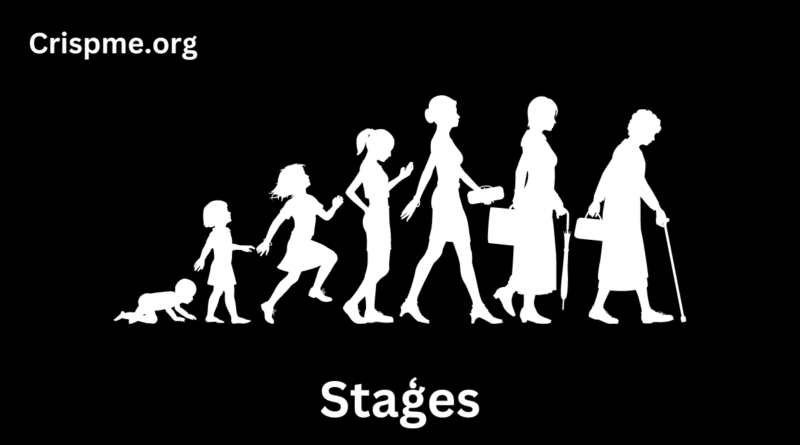Understanding Staģes: Navigating Life’s Journey through Developmental Milestones
Introduction
Staģes, in the context of human life, represent pivotal phases marked by physical, personal, academic, and social achievements. These staģes signify transformative periods that shape behaviors, decisions, and relationships, crucial for personal growth and societal contribution. By comprehending these stages, individuals and organizations can better prepare for and navigate life’s complexities, leveraging opportunities and effectively managing challenges.
The Significance of Staģes
Staged from childhood to old age. It brings unique challenges and opportunities that mold lives. Adolescence and early infancy emphasize identity, learning, and socialization. Early years influence intelligence and emotion. Understanding these early experiences encourages curiosity, inquiry, and skill-building.Young adulthood involves career exploration, education, and relationships. Independence helps people find themselves and make decisions. Academic and professional aspirations impact personal and career goals. Education and skill acquisition prepare people for success and fulfillment.Middle adulthood brings job security and family. Professional growth and personal/social balance are involved. Skills are now used to enhance careers and communities. Middle adulthood growth aids personal and professional changes.Late adulthood is about connections and legacy.
Methods for Seeing Life’s Staģes
Perceiving life’s stages needs consciousness, introspection, and proactive planning. Different methods can be used to identify and investigate phases. Thus, strategies included defining clear goals, counseling with a variety of trustworthy mentors, a growth outlook, and lifelong learning opportunities. Being in tune with changing needs and aspirations might help people navigate life changes smoothly.Perceiving life’s stages requires developing empathy, interest, and social skills to understand others’ perspectives. By acknowledging each man’s spirit as worthy of praise and pride, people may create a local region based on shared encounters, fostering stronger relationships, advancing civil rights, and spreading human value.
Youth Unwinding: Development’s Foundation
Youth is intriguing and prepares for growth. It starts with small skills and information that improve conduct and values. Physical, mental, and socio-profound zones create a stage (Thorpe, 2017). This time helps kids develop a stable worldview and form meaningful relationships.Guardians provide a safe and supportive environment and stimulate curiosity and innovation in children. Every letdown is followed by an average retreat. A child is the best legacy, helping us understand life-changing events and form our beliefs and views. Parental figures, teachers, and strategy makers must understand kid development cycles and achievements to create stable environments and programs that foster success.
Applications in Personal and Professional Realms
Understanding stages helps people prepare for transitions and grow personally and professionally. Recognizing developmental tasks at each level helps people face problems with resilience and self-awareness. Lifelong learning and personal fulfillment are built on meaningful experiences and relationships that give people purpose and identity.Organizations that understand staff development boost professional growth. Organizations can encourage continual learning and innovation by tailoring training and career progression to employee needs. Leadership and mentorship programmes prepare individuals for changing difficulties and help organisations achieve goals.
Cultural and Social Dimensions
It also reflect cultural and social conventions, greatly affecting behavior and expectations. Ramadan, which involves fasting and introspection, symbolizes spiritual progress and community connection. Such rituals build cultural identity and community bonds, fostering empathy and understanding across varied people.Each stage of growth shapes social interactions, including communication and relationships. From childhood bonds to adult professional networks, stages determine social depth and scope. Communities may celebrate diversity and promote mutual respect by understanding individual developmental requirements in social circumstances.
Conclusion
In essence, Staģes are integral to the human experience, guiding individuals and organizations through life’s journey. By acknowledging and understanding these developmental phases, we can foster personal resilience, professional success, and cultural sensitivity. Embracing stages allows us to appreciate the richness of human diversity and the continual evolution of individual potential.
FAQs
Why are stages of development important?
Stages provide a framework for understanding personal growth, guiding individuals through key milestones from childhood to old age. They help anticipate challenges and capitalize on opportunities, fostering resilience and lifelong learning.
How do staģes impact organizational success?
By recognizing employee development stages, organizations can tailor training and support programs to enhance employee satisfaction, productivity, and retention. This alignment ensures that organizational goals are met while promoting individual career growth and fulfillment.
What role does culture play in staģes?
Culture shapes stages through traditions, rituals, and societal expectations, influencing personal identity, behavior, and community dynamics. By embracing cultural diversity and traditions, individuals and communities enrich their collective experiences and promote mutual understanding.
How can individuals apply knowledge of staģes in everyday life?
Understanding stages helps individuals make informed decisions about education, career, relationships, and personal development. By recognizing the developmental tasks associated with each stage, individuals can navigate life’s challenges with confidence and adaptability, ensuring continuous personal growth and fulfillment.




